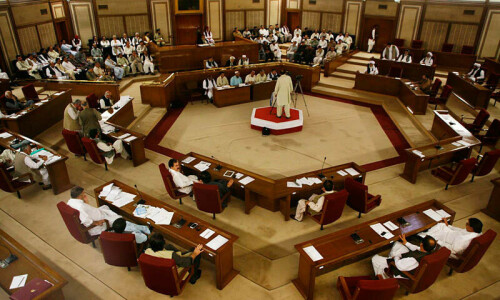THE world loves a good scandal, and the story of the fall of Gen David Petraeus had all the best ingredients: a sassy mistress, a spurned matronly wife, lots of secret missives and the suggestion if not proof of wrongdoing.
In the fallow period, after results of the US election had been digested, it provided the American news media a spicy answer to the question, ‘What do we talk about now?’ The yammering has continued since, with all its usual perversions — righteous shock, feigned outrage and venomous curiosity, the entire gamut of emotions.
As the web widened, revealing gold-digging socialites and even more errant generals, the dissections and speculations have continued in an unabated downpour. Could there be a better scripted version of poetic justice than the head of the American spy agency brought down by the actions of the chief criminal investigation agency?
It is in this last fact that the downfall of Gen Petraeus and the impending dethroning of Gen John Allen presents a commentary beyond the saucy superficialities of scandal and into the workings of and competition between America’s two most powerful agencies, the CIA and FBI.
A representative episode of their tense dynamics took place, interestingly, in Pakistan itself. On March 28, 2002, the FBI, CIA and the Pakistani ISI carried out a joint operation in Faisalabad to capture the Al Qaeda operative known as Abu Zubaydah. Recounted at length in Terry McDermott and Josh Meyer’s recent book The Hunt for KSM, the operation required the juggling of different protocols, modus operandi and the like. Surprisingly, the struggle lay not in getting Pakistanis to work with Americans but just as much in enforcing cooperation between the CIA and FBI.
At one chilling moment when the shot and bleeding Abu Zubaydah is being transferred to a secret interrogation centre in Thailand, the FBI agents on the flight attempt — much to the chagrin of CIA officers — to fingerprint him so his identity can be ensured. “Who the hell would want that?” asks the irate CIA pilot; the “director of the FBI” is the response provided.
The Petraeus scandal had no direct connection with the capture of Abu Zubaydah but the crucial differences highlighted in that episode are relevant to the toppling of generals. As Meyer and McDermott point out, the FBI is a crime investigation agency concerned with the past, with collecting evidence and with crimes that have taken place. The CIA is concerned with intelligence and the pre-emption of what could happen.
In the fear-filled world of post-9/11 America, it was the backward-looking FBI with its onerous attention to laws, its efforts to collect evidence that would stand up in court, its preoccupation with warrants and permissions to search and seize that came under scrutiny.
In the USA Patriot Act of 2001 and the versions that followed, it was these aspects of the FBI that were changed, all guided by the belief that if the agency could be more like the CIA, less bogged down by laws and procedures, more secret and surreptitious, then terrorism could be defeated.
Appointed to head the CIA 18 months ago, Gen Petraeus moved from the rigid, rule-laden, hierarchical edifice of the US military to an organisation where secrecy was everything and rules unknown, bendable or non-existent.
In the universe of the ‘war on terror’, if the FBI had been pushed to become more like the CIA, the latter got licence to become an ever-more sinister version of itself.
If secret prisons to haul off captives such as Abu Zubaydah to were routine business in 2002, by 2012 the CIA — with a bevy of unidentified operatives, men unencumbered by the weight of rules of engagement — were handed remote controls that could fire lethal missiles.
Since the CIA looks to the future, they could kill not only those who had already committed acts of terror but even those that seemed likely to do so in the future, complete licence for complete annihilation.
With such power attached to such crucial ends — the safety and security of the US — and with the ambit of rules and regulations suddenly having evaporated within the secrets-laden innards of the CIA, it is no surprise that its head, Gen Petraeus, might have believed himself to be invincible.
But before Pakistanis can nod and smile smugly at an American foible, dragging the issue into a Pakistani analogy is instructive.
Translated into Pakistani terms, the Petraeus story would read thus: the chief of the ISI being investigated at the behest of a wannabe paramour by a lowly FIA agent. Imagine then, the FIA agent perusing thousands of personal emails of the ISI chief and then taking his findings to his superiors.
If all this seems impossible and unlikely, tax your powers of wonder a bit further by conjuring up the image of top FIA agents taking the issue to elected legislators of the opposing party on the eve of a national election.
In your final act of disbelief, swallow this: that everyone in that party that could reap enormous electoral dividends by leaking the news to the press sacrifices their own interests by simply keeping quiet.
There may be no smugness permissible to Pakistanis here, but in the excision of Gen Petraeus and the fact that it came through an FBI investigation does provide some small victory to the maxim that law and procedure, however onerous and cumbersome, are not roadblocks but valuable limits to power and its abuse.
If justice were perfect and the world truly fair, it would have been more gratifying if the man had fallen for his better-known wartime sins. But, again and again, serial killers have been ultimately been caught for running traffic lights; it is perhaps the universe’s logic that generals must fall for cheating on their wives.
The writer is an attorney teaching constitutional law and political philosophy.











































Dear visitor, the comments section is undergoing an overhaul and will return soon.